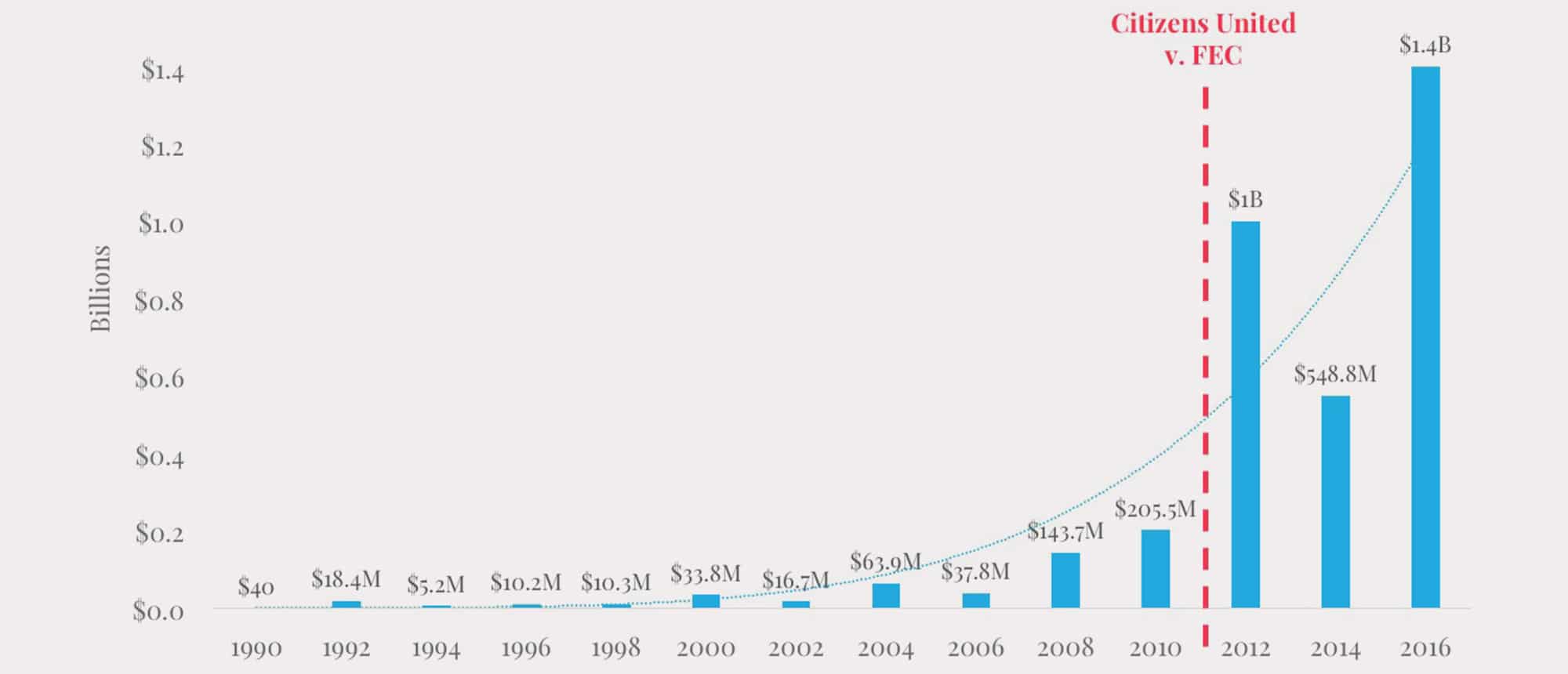Citizens United: The Legacy
Most people have heard of “Citizens United.” It is considered one of the most influential Supreme Court cases of the 21st century – a decision that significantly altered the interaction between money and politics in modern America. Since the 2010 Citizens United v. Federal Election Commission (FEC) Supreme Court decision, countless academics and experts have talked about it, and thousands of people have come out to protest against it. But what is it and what effect has it had on politics in America?
In order to understand the changes that Citizens United v. FEC has had on American politics, it is important to understand the campaign finance laws that had been in place in the United States.
Prior to Citizens United, Campaign Reform Act (McCain-Feingold Act, 2002) had modified the Federal Election Campaign Act to prohibit corporations and unions from spending on “electioneering communications.” This included any communications that directly mentioned a candidate in any context within 30 days of a primary election and 60 days before a general election. Essentially: corporations and unions were not allowed to use their money to directly influence the outcome of an election.
When Michael Moore’s documentary (Fahrenheit 9/11, 2004) about 9/11, the Bush Administration, and the wars in Iraq and Afghanistan came out, an organization called Citizens United challenged this release with the FEC stating that Fahrenheit 9/11 was “electioneering communications.” The FEC found that the film did not violate the Act. As a result, during the next election cycle in 2008 Citizens United created their own documentary entitled Hillary: The Movie.
A district court found that Hillary: The Movie was clearly created to encourage voters to vote against then-Senator Clinton. Therefore, it found that the film and any trailers for the film would be classified as advocacy and would be in violation of campaign finance laws. Citizens United appealed that initial decision and the case was eventually heard in front of the Supreme Court in 2010.
The Supreme Court’s decision in Citizens United v. FEC drastically changed the role of corporations in politics.
In a 5-4 split, the Supreme Court found that any restriction in independent expenditures by corporations and unions violated the First Amendment’s protection of free speech and that the current laws that restricted corporations and unions (or what they deemed “associations of individuals”) from spending money on electioneering communications was violating their right to free speech.
For many Supreme Court decisions, the justices who vote against the ultimate decision release what is called a “dissent.” In his dissent to Citizens United v. FEC, Justice Stevens raised several important points. The first was that this decision conferred the same rights to corporations as citizens and that “although they make enormous contributions to our society, corporations are not actually members of it. They cannot vote or run for office. Because they may be managed and controlled by nonresidents, their interests may conflict in fundamental respects with the interests of eligible voters. The financial resources, legal structure, and instrumental orientation of corporations raise legitimate concerns about their role in the electoral process.”
Justice Stevens’ second point was that with this new freedom, corporations will have significantly greater power in our democracy which may erode our trust in our democracy, as well as our democracy itself: “Corporate “domination” of electioneering… can generate the impression that corporations dominate our democracy. When citizens turn on their televisions and radios before an election and hear only corporate electioneering, they may lose faith in their capacity, as citizens, to influence public policy.”
Justice Stevens ends his dissent with the statement that “While American democracy is imperfect, few outside the majority of this Court would have thought its flaws included a dearth of corporate money in politics.”
Eight years after Citizens United v. FEC, it is important to look back and determine how this decision has changed politics in America – were Justice Stevens’ predictions correct?
The first, and most clear, result is that campaign spending by outside sources has significantly increased since this decision. According to Open Secrets, outside spending by election cycle had been increasing between the 1990 (the earliest data Open Secrets publishes) and 2010. However, in 2012, the first election cycle after Citizens United v. FEC, outside spending jumped to five times its level in 2010. Outside organizations spent one billion dollars in 2012, $500 million in 2014 and $1.4 billion in 2016.
However, the next question is: does it matter? And the answer is: usually, yes.
In 2014, Represent Us investigated the correlations between spending more money and winning elections. They found that in nine out of ten times, the candidate that raised the most amount of money won the election. They also found that winning candidates spent an average of twenty times as much as their competitors.
In reporting on this finding, The Washington Post mentioned a variety of reasons that the better financed candidate might win: the money allows for a better run campaign, incumbents tend to have campaign structures and fundraising already in place, and “some would argue that in many cases the candidates who win the most votes do so based on the same electability, popularity and qualifications that make them the best at fundraising, and vice versa.” However, the outcome is clear: more money correlates very strongly with chances of winning.
Stevens suggested that Citizens United v. FEC would have a demoralizing effect on democracy. Currently, 63% of Americans are dissatisfied with corporate size and influence in politics; in the 2016 election, almost four-in-ten (38.6%) eligible voters did not vote</a>; and fewer than one-in-five (17%) Americans approve of the way that members of Congress are handling their job. It is hard to make the case that Americans are encouraged by the direction of American government and the amount of corporate influence.
The important question now, is what do we do about it?

